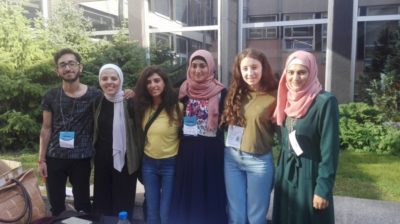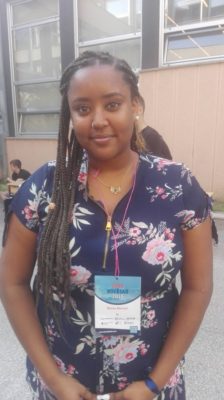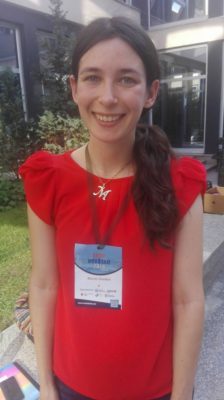Joining EUDC for the first time – Interview with Palestine
Dhalia Alayassa, Tamara Abdel Lafit and Iman Sarj are students at the Alquds University and the An-Najah University. They are the first university students from Palestine to compete at the EUDC. Additionally, Weenta Mehari coaches Alquds University and Mariel Golden is the coach of An-Najah University. We interviewed them about Palestine joining the EUDC.

The Palestinian delegation – © Elisabeth Vikydal
Dhalia, Tamara and Iman
Achte Minute: Hello, you three! What is debate like in Palestine?
Dhalia Alayassa: Well, the debate community in Palestine is new in general, mainly it started two to three years ago but Palestine is making good accomplishments. We held a Palestinian national tournament last year, we’re holding an international tournament this year in September, we made it to WSDC, to World School’s academy, a Palestinian speaker was the 9th best at the academy – it was me, (laughs) we made it to EUDC. Our community is just new but it’s making huge accomplishments and we’re really proud of that.
AM: What is the main reason why you want to join the EUDC?
Tamara Abdel Lafit: Mainly two things. First, we really want the debate culture to move into Palestine, to have more debaters interested and be into it because we don’t really have a debate culture back in Palestine. A second thing, I think it’s very important that Palestine is being represented in Euros and Worlds in the future, to be represented and have more Arab students joining those tournaments.
Iman Sarj: It is very important to have the Palestinian voice heard. This is the first time ever Palestinians come here. A lot of people hear about Palestine but you don’t really know the story, so it is very important to be here and tell people our story and what is going on and have the Palestinian voice heard here.
AM: What has been the community response to you coming here?
DA: Everyone’s been really nice and interested , they love to ask questions, they are very curious and we’re happy that they are interested and want to ask questions and know more.
IS: Our community has been very supportive. The money and our donations mostly came from Palestinian business women and we’re also really proud that it was women who donated. That tells a lot about our society, so from here I’m saying thank you to all those women who donated money and help our team come here.
AM: Thank you for your time!

Weenta Mehari – © Elisabeth Vikydal
Weenta and Mariel
AM: Hello! What is coaching in Palestine like?
Weenta Mehari: Coaching in Palestine is a very eye opening experience. I feel like I’m learning more from my students sometimes than I’m actually contributing. I recently started doing debate, last year actually, when I got to Palestine and it’s been a real eye-opening experience and learning about the different communities that exist for debate, I never thought me and these students would be coming to the European championship in a year, nonetheless. It’s incredible.
AM: What does EUDC mean to you?
WM: I think it means more to them than to me. I have an American passport, so I feel like I’m already pretty privileged. But for me, vicuriously, it means someone is recognising the worth of these students and seeing what they are able to accomplish and achieve. It also means that the work they put in this past year is recognised. It’s kind of a stepping stone because some of these students have already been to WSDC , so this is the next step which i hope will be a continuous thing. They are one of the first two Palestinian teams to come to EUDC, so it means a lot.
AM: In five years time, where would you like Palestinian debating to be?
WM: Could you rephrase that?
AM: What are your goals for Palestinian debating?
WM: I have goals for my students. That they are able to be self-sufficient in debating and use this as a networking opportunity climb up this ladder and have just as many opportunities as their privileged counterparts. For me, seeing how debate has been working in this past year, it’s very much a privileged environment and community, so I’m not sure if i could say for five years because I don’t know if I’ll be in the region that long but i hope they’re taking this experience, they graduate from college and they plug back into this debate community and take to flourish their own communities just as as they have started with their own debate culture and programmes.

Mariel Golden – © Elisabeth Vikydal
AM: What does EUDC mean to you in terms of enabling the Palestinians to come here?
Mariel Golden: For me it just means they get access to a very large segment of the debate community which allows Palestinian debate to grow which is super important because right now Palestinian debate is kind of in isolation. We don’t have many partners, so coming here is just a way to make connections and really strengthen the circuit back home in Palestine and bring the knowledge from here back to there.
AM: Who or what has helped grow the circuit the most?
MG: I think people coming together and doing tournaments. We organise a couple of national tournaments, one at Al-Najah, one at Alquds Bard, we did an international tournament, we’re doing another international tournament. It’s really running these competitions that’s allowed the circuit to grow and means people from multiple universities come together and do debates and i think it’s what helps launch the initiative and why people are coming to Euros because people are seeing that this is a real competitive activity that they can participate in.
AM: What are your longterm goals for Palestinian debating?
MG: That Palestinians break at Euros and break at Worlds. That’s the ultimate long-term goal. I think we’re a little bit away from that now but I think that’s the goal.
AM: Alright. Thank you as well, and enjoy the tournament!
vik./lok.






I feel very proud to participate the Palestinian girls , really it is privilege
I feel that debate should not take into politucs.
If these palestinian students want to use these events to spread hate againt another country, then this is wrong.
The only voice is the debate voice and not politics voice.